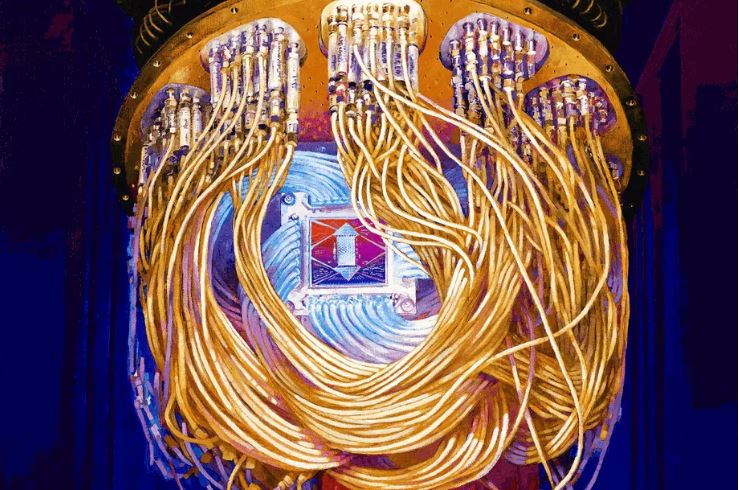So on-brand for 2020.
“’I have learned this Kung Fu skill since I turned 67 years old. I think it is good for my health. I insist on doing it every day.”

Tales of True Adventure for Rugged Men Not Unlike Yourself
So on-brand for 2020.
“’I have learned this Kung Fu skill since I turned 67 years old. I think it is good for my health. I insist on doing it every day.”
I have no idea who Seth Ickerman or Carpenter Brut are, but I like it.
Hail Satan?
Fascinating stuff. This is part 1 of 4.
When a scammer connected to my PC, I was able to reverse their connection and discover that they had CCTV. You’re going to see the most detailed exposé of a tech support scam ever seen on YouTube. The company were called Faremart.com – A travel agency in Delhi who use their buildings and VOIP telephony to run various scams. They are one of hundreds of scam call centres in India and this one group will make over $3 million per year with scams.
Did anyone notice that Dead Stars put out a new record a couple months ago? Me neither!
Electronic pop duo Silver Apples released their first album in ’68. I believe that makes them the first ever electronic pop band, predating Can, Kraftwerk, et al. If any of you bastards know of someone prior to these guys, please clue me in. They sold very few albums, but one somehow ended up in my house in the mid 70’s. Ignorant that they predated Kraftwerk, I pretty much dismissed them because I didn’t like the songs very much. They typically set up good initial ideas but, in my opnion, are let down by the singing and trippy lyrics, which creep me out for some reason. But the electronic sounds are innovative and excellent. Those sounds come from “The Simeon,” a primitive, homemade synth built by singer Simeon Coxe, an Alabaman. He was just stringing together old WWII oscillators and claims that at the time he’d never heard of Moogs or other synthesizers in develpoment.
Silver Apples’ legacy is hard to pin down. Some 90’s experimental bands have cited them as an influence, but what about the electronic innovators of the 70’s? You never heard a word about these guys back then, so did they influence Krautrock, Eno, Devo, prog rockers, or just work in a vacuum? Who knows, but I can’t help but love their oddball creativity. Very much in the tradition of American cranks innovating alone in the basement or garage. But overall they show that first usually isn’t best.
Here is their full story, which is very interesting. If you want to hear more, below is the entire first album and one song, “You and I”, from their second and final album, which was withdrawn soon after release. The opening of “You and I” is suspiciously like “Station To Station,” but I have no idea if Bowie was familiar with it. The whole second album, which I haven’t heard, is also on YouTube.
…this song has potential relevance.
Influences on proud display.
Holy shit, this takes me back. For the uninitiated, Wiki-wiki-wikipedia says …
Myst is a graphic adventure puzzle video game designed by the Miller brothers, Robyn and Rand. It was developed by Cyan, Inc., published by Brøderbund, and released as a PC game for the Macintosh platform in 1993. In the game, players are told that a special book has caused them to travel to Myst Island. There, players solve puzzles and, by doing so, travel to four other worlds, known as Ages, which reveal the backstory of the game’s characters.
And then Ars Technica goes …
A few months back, Ars caught up with Myst developer Rand Miller … at the Cyan offices in Washington state to ask about the process of bringing the haunting island world to life. Myst’s visuals lived at the cutting edge of what interactive CD-ROM technology could deliver at the beginning of the multimedia age, and, perhaps unsurprisingly, fitting the breadth of the Millers’ vision onto CD-ROM didn’t happen without some challenges.
In a way, I’m kind of shocked to hear that Cyan is still around. But then again, they made a fortune on Myst and Riven (the followup), so I really shouldn’t be.

(artist’s drawing of Google’s quantum computer chip)
In October, Google built a quantum computer that solved an incredibly hard problem in 200 seconds — a problem the world’s fastest supercomputer would take 10,000 years to solve. This is called “quantum supremacy”, and has been compared to the Wright Brothers’ first flight.
”Until recently, every computer on the planet — from a 1960s mainframe to your iPhone, and even inventions as superficially exotic as ‘neuromorphic computers’ and DNA computers — has operated on the same rules. These were rules that Charles Babbage understood in the 1830s and that Alan Turing codified in the 1930s. Through the course of the computer revolution, all that has changed at the lowest level are the numbers: speed, amount of RAM and hard disk, number of parallel processors.
But quantum computing is different. It’s the first computing paradigm since Turing that’s expected to change the fundamental scaling behavior of algorithms, making certain tasks feasible that had previously been exponentially hard. Of these, the most famous examples are simulating quantum physics and chemistry, and breaking much of the encryption that currently secures the internet.”
I’m sure this will go well.
More here.